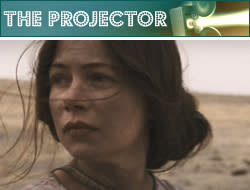Review: ‘Meek’s Cutoff’

Of the many subjects about which to make a movie, telling a story about characters who are wandering around lost might be one of the toughest, especially when it's doubtful they're ever going to get anywhere. That's the challenge director Kelly Reichardt has given herself with "Meek's Cutoff," a spare and meditative drama starring Michelle Williams and Bruce Greenwood about three families hiking the Oregon Trail in 1845.
From the outset, it's clear that this collection of individuals don't know where they're going, when they veered off course, or even how to get back on the trail. We don't learn much about these people, so we have to pick up clues along the way. Emily (Williams) has recently married the much older Solomon (Will Patton), who is embarking on this quest through the dry, deserted mountains of Oregon in search of a better life. The wagon team is led by Stephen Meek (Greenwood), a big-talking, bearded man who claims to know this uncharted territory like the back of his hand, except now he's lost, although he insists that he's not lost -- just delayed. With water and food in short supply and the sun beating down on them, the travelers face the possibility that death could be coming for them from starvation or an Indian attack.
Reichardt has previously made two great Oregon-set films: the male-friendship drama "Old Joy" and "Wendy and Lucy," which starred Williams as another young woman on a quest for a happier tomorrow. Her movies are quiet and have very simple storylines that allow the audience to observe the characters up close. (Often, it feels like we're eavesdropping on intimate moments really captured on screen.) And while "Meek's Cutoff" has an open-skied beauty that's reminiscent of other recent Western tales like "There Will Be Blood," Reichardt's film (written by "Wendy and Lucy" co-writer Jon Raymond) isn't working on a big, bold canvas. In fact, the movie isn't even widescreen: It was shot in a 1.33 aspect ratio that, in layman's terms, means that the image is more box-sized, trapping the characters in the frame.
This technical detail is important because it hints at what Reichardt is going for. She doesn't want "Meek's Cutoff" to be a typical Western in which you marvel at the vast skies. Rather, she wants us to focus on these people and their plight as they trudge forward in the hopes that maybe water or a sign will present itself over the next hill.
Because not a lot happens -- over the movie's 104-minute running time, there are probably only three or four major incidents that occur -- "Meek's Cutoff" is very much an existential journey as much as it is a physical one. Along those lines, none of the characters go through a conventional three-act arc where they grow or change. Quite the contrary: With their plainspoken dialogue, these people are supposed to seem ordinary and anonymous, with Meek's cocksure attitude the only hint of colorful detail. Tellingly, because their situation is so dire, his behavior isn't lively or comforting: It's deeply worrisome, which explains why the rest of the characters from the beginning are starting to suspect that they've chosen a poor guide to lead them to the promised land.
If you're willing to adapt to Reichardt's rhythm and accept that this is a quest in which the destination is blurry at best, "Meek's Cutoff" can be a powerfully hypnotic ride. With a potently simple score by Jeff Grace that emphasizes the vast, potentially dangerous emptiness around them, the movie starts to feel almost biblical, the journey becoming a metaphor for uncertainty, fear, mortality, even the end of the world.
Not surprisingly, then, "Meek's Cutoff" has been deemed in some circles a masterpiece. And while I wouldn't go that far, I can see these critics' point of view: It's a movie in which you give yourself over to its bleak, solemn tone as it builds to a profound sense of the grandeur of the natural world and our shockingly insignificant role in it. What keeps me from being quite as ecstatic is that, as masterful as it can be, "Meek's Cutoff" ends up suggesting many themes without necessarily owning any of them definitively. Normally, I welcome a movie that doesn't spell out everything it's supposed to be "about," but Reichardt's bone-dry drama can't help but feel somewhat slight. This is that rare film that's deeply profound and vaguely undernourished at the same time.
The same goes for the performances. Especially on a second viewing, it's clear how great Greenwood and Williams are in the film, his brash foolishness nicely complementing her brave, no-nonsense demeanor. But many of the supporting characters fall by the wayside, failing to leave much of an impact. This is partly by design, but Paul Dano and Will Patton mostly exude a muted ruggedness that seems willfully withholding. Reichardt has stripped away all but the essentials for her film -- even the camera barely moves -- but the austerity can feel too self-conscious at times.
Of course, those who worship this film love it for that exact reason: "Meek's Cutoff" is utterly uncompromising in its approach, and its fans celebrate the skill at which Reichardt and her cast pull off their approach. I wish I could get there with my colleagues: Here's a movie with such richness and confidence and elegance on display. I get lost on the way to calling it a masterpiece, but despite my modest reservations this is absolutely a journey I wouldn't have missed for the world.
Grade: B+

